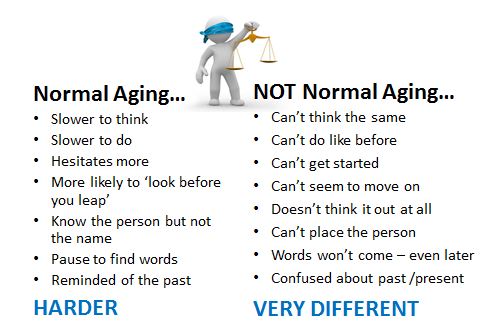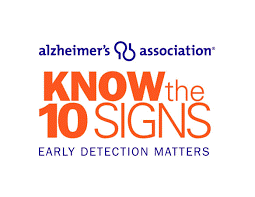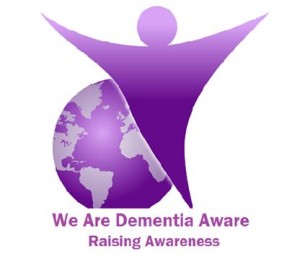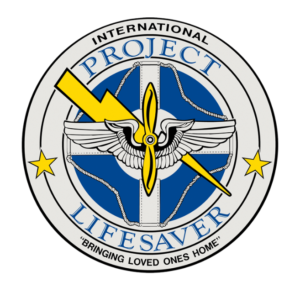Staff at the Aging and Disability Resource Center (ADRC) of the North can provide information and support for individuals with dementia, family caregivers, and the community at large.
DEMENTIA CARE SPECIALISTS
The mission of the Dementia Care Specialist (DCS) Program is to support people with dementia and their caregivers in order to ensure the highest quality of life possible while living at home. The DCS can help people who have dementia or are concerned they may have symptoms, people caring for someone with dementia, and businesses interested in learning about dementia friendly communities.
On this page, you’ll find dementia-related information and programs offered by the ADRC of the North as well as opportunities to learn more about dementia through videos and helpful links. If you have questions or would like to connect with your local Dementia Care Specialist, please contact us at 1-866-663-3607 and our friendly staff will be happy to assist you.
What is Dementia?
Memory changes or other changes in how our brain works can be scary. Understanding the difference between “Normal Aging” and “Not Normal Aging” is the first step in sorting out these changes. There are many reasons why these changes take place.
Dementia is not part of normal aging. It is a disease. There are other medical conditions that may mimic the signs and symptoms that we normally associate with dementia. It is our responsibility to make sure these other factors are addressed and being treated by a health care provider. The video below offers a brief overview:
Below is a picture that compares “Normal Aging” vs. “Not Normal Aging”. If you find yourself or someone else with similarities listed in the left column (“Not Normal Aging”), contact the ADRC of the North for information about Memory Screens or Memory Clinic resources.
SIX PILLARS OF BRAIN HEALTH

Lifestyle has a profound impact on your brain health. What you eat and drink, how much you exercise, how well you sleep, the way you socialize, and how you manage stress are all critically important to your brain health. Learn more at about the Six Pillars of Brain Health here.
EARLY DETECTION – Know the 10 Signs
Early detection matters. Knowing the early signs of dementia will help identify if there is a need for a more comprehensive evaluation. The Alzheimer’s Association offers detailed information about Early Signs and Symptoms; click here to learn more.
MEMORY SCREENS
ADRC of the North staff are trained to provide Memory Screens. The screening tool that we use takes about 15 minutes. Staff will review the screen with you and provide information and resources about supporting your brain health. Download a Memory Screen brochure here.
Why have a screen done?
Think of the memory screen as a wellness tool, like a blood pressure, cholesterol, or stroke screen. You can have a memory screen done if you have concerns, a family history, or before you notice memory loss symptoms to establish a baseline that you can refer to in the future. Knowing your cognitive baseline allows you to become proactive in monitoring your brain health. Memory loss caught early can mean more control of your life and a higher quality of life.
What if the screen shows areas of concern?
The screening tool used by the ADRC-North does not diagnose dementia. It provides an assessment of how your brain is functioning in a single moment. There are many reasons why a screen might detect cognitive or memory concerns, such as stress, sleep imbalances, challenges in vision or hearing, chronic pain, medication side effects…. The list goes on.
If concerns are noted, staff will share possible causes related to the screen results and refer you to a qualified health care provider. Memory screens are confidential but can be shared with your health care provider if you choose to do so. A medical provider is the only person who is able to provide a dementia diagnosis, and this is commonly done only after other possible causes of cognition or memory changes have been ruled out. If, upon further evaluation by a medical professional, it is determined that you have dementia or mild cognitive impairment, you can be proactive in developing a support system and become involved in early intervention programs that may slow the challenges experienced with dementia.
Below is a video clip about Memory Screens:
- Where can I get a Memory Screen?
- Screens can be done in our offices or in your home. Call our friendly staff at 1-866-663-3607 to set up a time to have your screen completed.
- How often should I have a Memory Screen?
- We recommend an initial baseline screen and then a re-screen every year to monitor your brain health.
- How much do the screens cost?
- The Memory Screens that we provide are FREE.
FAMILY CAREGIVERS
Helpful links and information for caregivers:
- Wisconsin Family Caregiver Support Programs
- Alzheimer’s Association
- Teepa Snow / Positive Approach to Care
- Lewy Body Dementia Association
- Association for Frontotemporal Degeneration
- Family Caregiver Alliance
- Administration for Community Living
DEMENTIA FRIENDLY COMMUNITIES
This section will cover the “why” and “how” behind community awareness and support for our friends, families & neighbors. As you will see below, our community is aging. As the greatest risk factor for developing some type of dementia is “getting older”, we need to start making changes now to support us tomorrow.
DEMOGRAPHICS
Our state is aging at a fast rate. Compare the pictures below that show the change in our population over the next 20 years. The dark blue indicates a high percentage of people over the age of 65. Click here to go the the Wisconsin DHS website for more information.
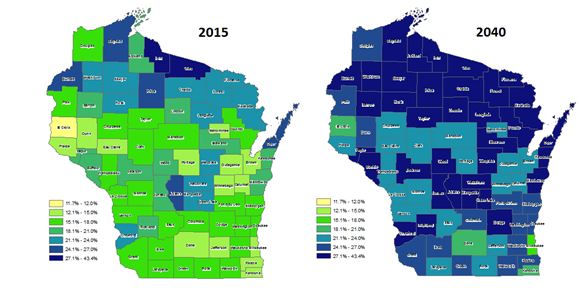
INCREASED CIVIC AWARENESS
View this video clip to experience the difference a Dementia Friendly Community can make for a person with early cognitive changes when attempting to complete daily tasks in their local community.
DEMENTIA FRIENDLY BUSINESSES
The Dementia Friendly Business/Agency training program is facilitated by your local Dementia Network. Click the following links to learn more about the Dementia Networks in the ADRC-North’s region: Ashland/Bayfield Counties, Sawyer County
Your business/agency can become dementia friendly in a couple of ways:
- Provide a “Lunch~N~Learn” for your staff.
- Have a member of your staff participate in the “Train the Trainer” program and train your current and future staff in house.
Our goal is to provide you and your staff the awareness to identify a customer or consumer who may be having some cognitive challenges, and know how to best assist them while they are at your business or agency.
Please contact your local Dementia Network coalition for more information or contact the ADRC of the North for assistance.
DEMENTIA-CAPABLE EMERGENCY RESPONSE
Wisconsin Silver Alert Program:
Similar to an Amber Alert, Silver Alerts go out by email and text message through the Wisconsin Crime Alert Network to notify the public that an adult with Alzheimer’s, dementia, or other permanent cognitive impairment is missing. Anyone may subscribe online here to receive free Silver Alerts and Crime Alerts.
Project Lifesaver:
A public safety program designed to protect and locate missing persons due to wandering. Contact your local law enforcement agency to find out if Project Lifesaver is available in your area.

